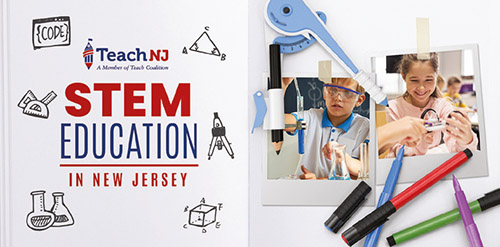
(Courtesy of Teach NJ) The STEM revolution has set the tone for the future—and Teach NJ and the New Jersey Department of Education are helping ensure yeshiva and day school students don’t get left behind.
Top public school teachers are being recruited to teach STEM subjects in yeshivot and day schools, as well as other non-public schools, with their salaries paid for entirely by the state, marking the first time in history that a government program like this exists.
“This is a huge win for the schools, our children, parents, public schools and their teachers,” says Katie Katz, Executive Director of Teach NJ, the organization that championed the bill for this program and dedicates significant resources to ensure its success and growth each year.
“It’s a major first step toward reaching our goal of lowering yeshiva tuition,” continues Katz. “By having some of the general education teachers’ salaries paid for by the state, our schools and parents will no longer have to pay out of their pockets for this major expense.”
Thirteen Jewish day schools and yeshivas will count 20 highly qualified public school STEM subject teachers on their teaching rosters this school year. These figures represent a 400 percent increase in the number of schools participating and a nearly 300 percent increase in the number of teachers compared to last year, when the program debuted.
“The fact that this program successfully launched during the height of COVID is a testament to how much non-public schools need and want this program,” said Adam Katz, Associate Director of Government Programs at Teach NJ.
Teach NJ recruits teachers and schools to participate, facilitates the application process, and acts as a liaison with the DOE. Adam notes that the money for this program does not in any way reduce or otherwise affect the DOE’s budget for public schools; the funding comes from a separate pot of money allocated for this specific program.
In today’s increasingly complex world, students need strong science, technology, engineering and math education so they can excel and succeed in college and their careers.
Yeshivot in particular have a difficult time recruiting quality STEM teachers, which is an expensive endeavor that already overstretched yeshiva budgets can’t always accommodate. Now, public school teachers who finish teaching by 2 or 3 p.m. can continue their workday by teaching in non-public schools. With their wages for these classes fully covered by the state, yeshiva budgets have a little more breathing room and more funds to divert to other areas in need of attention.
“We’re very grateful to Teach NJ for giving us the opportunity to expand our reach in scientific education,” declared Rabbi Eliezer Rubin, head of school of Rae Kushner Yeshiva High School in Livingston. “We can offer additional courses to our students at no additional cost to the school.”
Kushner was one of the three schools that benefited from the pilot program last year; JEC High School in Elizabeth and Heichal HaTorah in Teaneck also participated. In total, six public school teachers came on board among the three schools and taught robotics, engineering, CAD design engineering, applied science, computer science and more.
One of those teachers is Charles Galligan, who works at East Side High School in Newark during the earlier part of the day and in the afternoon at Heichal HaTorah, where he teaches geometry and computer science through the program. “I believe that STEM is the most important curriculum that students can be learning right now,” declared Mr. Galligan, who worked on Wall Street for 25 years before pursuing a second career in teaching. “It’s where the best opportunities exist for students when they leave school and look for jobs, and STEM is what’s going to propel us forward in the 21st century.”
The students taking classes taught by these public school teachers are equally benefitting from the program. Etiel Wilke, a student of Mr. Galligan’s at Heichal HaTorah said, “My peers and I learned the fundamentals of coding and even created some games. Now, we have the tools we need if we want to pursue this field in college and be at a higher level than other students who never learned this at the high school level.”
“This program between Teach NJ and New Jersey’s Department of Education is a great example of the kinds of critical initiatives that we can help implement with the support of our community members,” says Katie. “The more people who join our efforts, the faster and more effective we can be in changing the face of both the quality and cost of Jewish education.”










